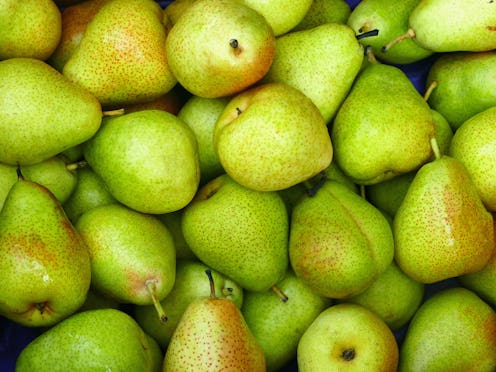Life
These 7 Foods Can Give You Gas

Let's be honest, no one really wants to sit down to brunch and figure out what foods cause gas the hard way. Though it can be embarrassing, everyone experiences it, and no one should be ashamed to acknowledge that our bodies sometimes have to release some flatulence. To make matters worse, sometimes gas can cause debilitating stomach aches and discomfort, and no one should have to feel too uncomfortable to admit to not feeling well. But why do some people experience more gas than others? It may actually be the types of food you're eating.
"When we eat, our digestive system breaks down food for usable energy for the body," Emily Hein, a registered dietician and nutritionist tells Bustle over email. "When foods are difficult to digest, these foods are fermented by the bacteria living in your colon."
Foods high in fiber, dairy products, and certain starchy foods are common foods that cause gas, so eating them in smaller quantities can help alleviate uncomfortable symptoms. "Once you've figured out which food causes gas, you can avoid it," says Hein. "Probiotics also work well to decrease bloating and cramping."
Gas is definitely not fun, so being in the know about what foods are problematic or not can help save a lot discomfort. These seven foods are common culprits when it comes to stomach and bloating problems, so try eating them in moderation if you find yourself feeling gassy often.
1. Dairy
"Many people are lactose-intolerant meaning they no longer make the enzyme lactase that breaks down the lactose (milk sugar)," says Hein.
Though not everyone reacts the same to dairy, if you suspect it may be causing you gas and bloating, switch to dairy alternatives or cut down on the amount of milk and cheese you're having to see if it helps alleviate the problem.
2. Carageenan
"Food additives like carageenan are known to upset some people's digestive tract," says Certified Nutritionist Jennifer Cassetta over email. "This is found in many dairy alternative products like almond milk, coconut milk, low quality yogurts, and ice creams."
Though derived from a natural ingredient, the additive has been found to increase inflammation in the body, according Prevention.
3. Gluten
Like dairy, if you have any intolerance to gluten, it may result in gas, bloating, and indigestion.
"Doing a gluten-free three-week challenge is a good way to see if that is the cause of your distress," says Cassetta. "After the three weeks, try eating wheat again, and see if the symptoms come back."
4. Beans And Lentils
Perhaps the most famous cause of gas, beans and lentils, are high in insoluble fiber, which is difficult for your digestive system to break down, according to the Mayo Clinic. Gas is produced when your body tries to deconstruct the fiber.
Some claim that soaking your beans and lentils in water prior to cooking can help reduce gas symptoms, but its efficacy is debated, according to an article in the Los Angeles Times.
5. Artificial Sweeteners
Some artificial sweeteners contain sugar alcohols, which can have a laxative effect if consumed in large amounts, and can cause gas, bloating, and possibly diarrhea, according to Yale-New Haven Hospital.
6. Cruciferous Vegetables
Though foods like kale, broccoli, and Brussels sprouts provide you with a lot of healthy vitamin and nutrients, they are known to cause gas because of their high fiber content. These veggies are also high in sulfur, which may contribute to some of your not-so-pleasant flatulence, according to Johns Hopkins Medicine.
7. Fruits Like Apples, Peaches, And Pears
Fruits like apples, peaches, and pears contain sorbitol, a naturally-occurring sugar-based alcohol. It is slowly metabolized by your body, which can cause bloating and gas, according Sirah Dubois, a dietician, in an article for Livestrong. Not everyone experiences gas from sorbitol, but if you find you're experiencing discomfort, try eating these foods in smaller amounts until you figure out the real culprit. Chris Kilham, a specialist in natural medicine, noted that taking more time to chew your food thoroughly can also help alleviate gas in an article for Fox News.
Whether you just have occasional gas or it's something that has a habit of ruining your days and causing you discomfort, it's never a bad thing to pay extra attention to how what we're eating may be affecting our bodies.
Image: Getty Images (8)